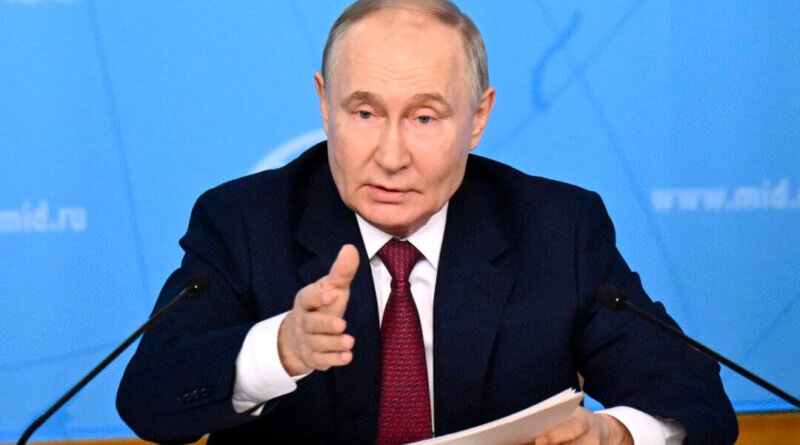Putin Threatens Tit-for-Tat Response if US Places Missiles in Germany
Earlier this month, Washington announced plans to deploy medium-range missiles in Germany by 2026.
Russian President Vladimir Putin stated that if the United States proceeds with its plan to position long-range missiles in Germany, Russia will lift its moratorium on medium-range missiles deployment.
During a speech to naval cadets in St. Petersburg, Mr. Putin expressed concerns about U.S. missiles in Germany being able to target Russian facilities and infrastructure within a short period.
He warned that the missiles could have nuclear warheads and a swift fly-in time of about 10 minutes to reach Russian targets.
Mr. Putin further mentioned that Russia was in the final stages of developing new strike systems in response to the perceived threat.
“We will take corresponding actions based on the deployment of these missiles by the United States and its allies around the world,” he added.
The U.S. Defense Department replied to The Epoch Times’ inquiry about Mr. Putin’s comments by stating, “We have nothing to read out at this time.”
The U.S. State Department did not respond to requests for comment by The Epoch Times at the time of publication.
Earlier in the month, Washington and Berlin jointly declared that the United States would deploy long-range missile systems in Germany.
They clarified that these deployments aim to lay the groundwork for the permanent stationing of such capabilities in the future.
The planned deployments will include SM-6, Tomahawk, and developmental hypersonic missiles with longer ranges than existing land-based fires in Europe, according to the statement.
Since the end of the Cold War in 1991, the United States has not openly deployed such missile systems in Europe.

According to the joint statement, this move demonstrates Washington’s ongoing commitment to the Western NATO alliance and its contributions to European integrated deterrence.
The announcement coincided with a significant NATO summit in Washington, where member countries, including Germany, reiterated their support for Ukraine, which Russia invaded in February 2022.
The declaration also emphasized that Russia posed the most direct and significant threat to the security of NATO members.
During the summit, a spokesperson for German Chancellor Olaf Scholz mentioned that the planned U.S. missile deployments were necessary to deter Russia.
On the other hand, Russia’s deputy foreign minister, Sergey Ryabkov, criticized the move as an intimidation strategy, and Moscow signaled its intention to devise a military response.
Moscow’s envoy to Washington, Anatoly Antonov, criticized the U.S.-German decision as a serious mistake that could lead to uncontrollable escalation along the Russia-NATO path.

Mr. Antonov accused the United States of disregarding the risky implications of breaking the Intermediate-Range Nuclear Forces (INF) Treaty.
Signed in 1987, the INF Treaty banned the deployment of ground-based missile systems with ranges exceeding 300 miles by Washington and Moscow.
In 2019, the United States withdrew from the treaty, citing Russia’s alleged violations involving intermediate-range cruise missiles—claims denied by Moscow.
Last month, Mr. Putin threatened to resume production of Russian medium-range missiles prohibited under the INF Treaty.
According to Moscow, the United States is currently producing its own medium-range missiles and has stationed them in Europe and Southeast Asia.
Mr. Ryabkov mentioned on July 18 that Moscow hadn’t ruled out deploying nuclear missiles if the United States proceeded with missile placements in Germany.
Russia’s invasion of eastern Ukraine, purportedly to protect Russian speakers in Donbas and prevent NATO’s eastward expansion, has been condemned by Kyiv and its allies as an unjustified land seizure.
Reuters contributed to this report.





